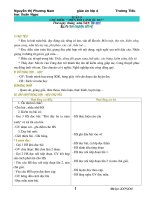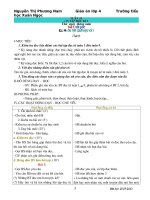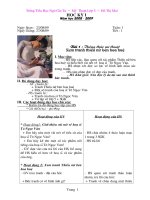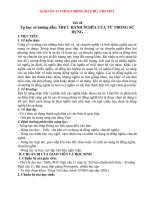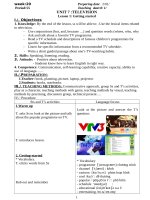GIAO AN PTNL THEO 5 HD DU 6789
Bạn đang xem bản rút gọn của tài liệu. Xem và tải ngay bản đầy đủ của tài liệu tại đây (224.86 KB, 46 trang )
The second term
week:20
Preparing date:
Period:37
Teaching date:
UNIT 6: THE ENVIRONMENT
Lesson 1: - Getting started
- Listen and read
I./. Objectives
1. Knowledge: By the end of the lesson, students can: know more about the
enviroment problems and the solutions.
2. Skills: Speaking, listening, reading
3. Attitude: - Positive about the environment.
- Students know how to learn English in right way.
4. Competence and quality:
4.1. Competence:
- General capacity:self-learning ability, communication capacity, capacity
to use language, cooperation capacity,…
- Specilized capacity:English language ability, develop self capacity,..
4.2. Quality: Love family and country, willing to participate in social
activities, live humanty, cooperate with people around,…
II./.PREPARATION:
1.Teacher: book, planning, picture, laptop, projector
2.Students: books, notebooks
III./.Procedure
TEACHER’S AND STUDENTS’
CONTENT
ACTIVITIES
1. Warmer:GETTING STARTED
- T says “ Today we’ll learn about the
environment. Now you look at the pictures
in book on page 47 and match with words
in box”
* New words :
- Garbage dump (n) : a place where the
garbage is stored : bãi rác
- Ss guess meaning of new words.
- Deforestation (n): cutting down the trees in
the forest for some purposes such as : farming
, selling . . .: sự tàn phá rừng
- T reads new words twice.
- Dynamite (n): ( translate): thuốc nổ
- Ss listen carefully and repeat.
- Spray (v) : ( action): phun
- Ss take note.
- Pesticide (n): (translate)
- T checks new words by playing “ Slap the
board”
Slap the board
- Ask Ss to match these environmental
problems to the pictures in the textbook.
Key:
- T explains new words
- Ss do individually and then Ss give the
answer on the board.
- T corrects and Ss take note
Matching: (environmental problems to the
pictures on page 47)
a - Air pollution.
b - Spraying pesticides.
c - Garbage dump.
d - Water pollution.
e - Deforestation.
f - Dynamite fishing.
Networks:
- T says “The environment is becoming
pollution, so what should we do in order to
save environment”.
- Ss discuss with a partner.
Cleaning
Save the
environment
up the
streets
- Then Ss give some ways to save the
environment by playing “ Networks”
planting
trees, . . .
collecting the trash
-TM: Play game, practising, discussion
group, technical present….
2. LISTEN AND READ
* New words :
-C: Co-operation, communication,…
- Shore = beach : bãi biển
-Q: Love family, friends and country
- Sand (n) : caùt
- T says “ Mr. Brown and some volunteer
conservationists are going to clear the
beach. Can you guess what they do there.”
- Rock (n) : (real object) : đá, hòn đá,
tảng đá
.
- Disappointed (adj.) ( situation): thất vọng
- Spoil = destroy:tàn phá, phá huyû
- T gives new words on the board
- Ss guess the meaning of words.
- Pollute (v)( translate) : làm ô nhiễm,
gây ô nhiễm
- T reads new words twice and Ss repeat.
- Pollution (n)( translation): Sự ô nhiễm
- Ss take note
What and where
- T checks new words by playing “what and
where”.
* Grammar : Conditional type 1
- T explains the grammar.
If – clause
Main - clause
- Ss take note.
- simple present
- will + V-infinitive
Ex :
- If we work hard, We will make this beach a
clean and beautiful place again.
- If I have more time, I will visit old friends.
* GUESSING ( OPEN PREDITION)
- T gives 4 sentences on the board and asks
Ss guess.
1. What is Mr. Brown going to do?
2. What is Mrs. Smith going to do?
- Ss work in groups to answer the questions.
3. What is Mr. Jones going to do?
- Ss give the keys on the board.
4. How many groups does Mr. brown
devide volunteer conservationists?
-TM: Play game, practising, discussion
group, technical present….
3. PRACTICE :
-C: Co-operation, communication,…
The answer
-Q: Love family, friends and country
1. Mr. Brown is going to give the bags for
the volunteer conservationists.
2. Mrs. Smith is going to cook a picnic
lunch for them.
- T opens the tape twice.
- Ss listen carefully .
3. Mr. Jones is going to collect all the
bags.
- Ss answer the questions
4. Mr. Brown divides volunteer
- T checks and helps Ss correct
conservationists into three groups.
- Ss take note.
a) Match the names in column A with the
tasks in column B.
- T asks Ss to read the text individually.
* The answer:
1) Group 1 : (f) walk along the shore.
- T asks Ss to read the passage again, and
ask Ss to match the names in column A with 2) Group 2 : (e) check the sand.
the tasks in column B. Then write the full
3) Group 3 : ( b) check among the rocks
sentences.
4) Mr. Jones : (a) collect all the bags and
- Ss work in group and give the keys on the
take them to the garbage dump.
board.
5) Mrs. Smith : (c) provide a picnic lunch
- T calls on some Ss to read the full
for everyone.
sentences.
6) Mr. brown: (d) give out the bags.
- T corrects and gives correct answer.
b) Answer/ P.48
- Ss take note
- T has Ss read the passage again and
answer the questions in b).
- T asks Ss to compare their answer with
friend.
- T goes around the class and provides
necessary correction.
- Ss give the answer on the board.
- T corrects and gives correct answer and
marks.
Marks
Key:
1. The speaker is Mr. Brown.
2. The listeners are members of volunteer
conservationists.
3. They are on the beach.
4. They are going to the beach.
5. If they work hard, they will make the
beach clean and beautiful again soon.
-TM: Play game, practising, discussion
group, technical present….
-C: Co-operation, communication,…
-Q: Love family, friends and country
4. PRODUCTION:
- T lets Ss work in group of three or four
and discuss questions 6 & 7 in the book.
Discussion:
6. Have you ever done anything similar? If
yes, what did you do? Where did you do?
- Then, T calls on some Ss to answer the
questions loud in front of the class.
7. If the polluttion continutes, what might
happen?
- T helps if possiple.
5. Production
- Learn new words and the grammar by heart.
- Do: exercise 2/P. 41- 42 (WB)
- Prepare Unit 6 - Speak
-------------------0@0--------------------
week:20
Preparing date:
Period:38
Teaching date:
UNIT 6: THE ENVIRONMENT
Lesson 2: Speak +Listen
I./. Objectives
1. Knowledge: By the end of the lesson, students can: practice persuading their
friends to protect the environment and know more about the environment problems
and the solutions.
2. Skills: Speaking, listening
3. Attitude: - Positive about the environment.
- Students know how to learn English in right way.
4. Competence and quality:
4.1. Competence:
- General capacity:self-learning ability, communication capacity, capacity
to use language, cooperation capacity,…
- Specilized capacity:English language ability, develop self capacity,..
4.2. Quality: Love family and country, willing to participate in social
activities, live humanty, cooperate with people around,…
II./.PREPARATION:
1.Teacher: book, planning, picture, laptop, projector
2.Students: books, notebooks
III./.Procedure
1. Warmer:
Jumbled words
1. opnitilulo = pollution
2. mpud = dump
3. iar = air
4. sptesecidi = pesticides
5. psary = spray
TEACHER’S AND
STUDENTS’ ACTIVITIES
-TM: Play game, practising,
discussion group, technical
present….
-C: Co-operation,
communication,…
-Q: Love family, friends and
country
CONTENT
2 . PRE – SPEAKING :
* Model sentences :
- I think you should. . .:
- Won’t you . . .?
- It would be better if you ….
- Why don’t you . . .?
- T asks Ss work in pairs, then
Ss give the answer on the board
- Why not . . .? - What/ How about . . .?
- T gives the correct words
* New words :
- T says “ in order to try to
persuade someone to do
something to protect the
environment. We can use the
following sentences.”
- T gives model sentences on
the board
- Banana leave (n) ( real object ): lá chuối
- lotu leave (n) ( real object): lá sen
- Wrap (v) ( action ): gói
- Dissolve (v): change something from soild
and liquid condition: tiêu huỷ
- Trash = garbage (n): rác
- T explains the way to use
- Garbage bin (n) (picture): thùng rác
model sentences and reads them
twice
- Exhaust fume (n) : (situation): khói thải
- Ss take note and repeat.
Rub out and remember
- T reads the ideas cue given in
the box and find new words.
3.WHILE – SPEAKING :
a) Try to presuade your partner to do the
following things to protect the environment.
-TM: Play game, practising,
discussion group, technical
present….
-C: Co-operation,
communication,…
-Q: Love family, friends and
country
- T gives new words on the
board.
- Ss guess meaning of new
words and take note.
Ex:
A : I think it would be better if we use banana
leaves instead of paper or plastic bags to wrap
food.
B : Why ? How come ?
A : Because plastic bags are very hard to
dissolve, they will cause pollution. And if we
use less paper, we can save trees in the forests.
That’s how we can save the invironment.
* Suggestion:
1)
- T reads new words twice.
A : I think it would be better if we reuse and
recycle bottles and cans.
- Ss listen and repeat.
B : Why ? How come ?
- T checks new words by
playing “ Rub out and
remember”.
A : Because reusing and recycling bottles can
reduce garbage and save natural resources.
2)
- T writes all the new words on
A : Why don’t we put garbage bins around the
the board in both English and
school yard ?
Vietnamese. Rub out all English
words and ask Ss to go to the
board, write these words again
according to equivalences.
- T asks Ss to read the
persuading expressions and the
ideas cues given in the textbook
carefully. Make sure Ss
understand all of the ideas
suggested.
- T lets Ss work in pairs,
persuade their partner to do
things to protect the
environment as example.
- T goes around and provide
help if necessary.
B : What for ?
A : To prevent lazy students from throwing
trash. That’s how we can keep the school yard
clean and protect the environment.
b) Find possible answer to the questionnaire.
LUCKY NUMBERS
3
2
1
4
8
5
6
7
- T calls on some pairs to
practice the dialogue before the
class.
- T corrects
- Ss take note
1. How can we save paper ?
2. Lucky number.
3. How can we use fewer plastic bags ?
4. How can we reduce water pollution?
5. Lucky number.
6. How can we prevent littering ?
7. How can we reduce air pollution ?
T asks Ss to do individually to
8. How can we reduce the amount of
find the answers to the
questionnaire.
- T checks by playing “ Lucky
members “.
gabage we produce ?
c) Now discuss with a partner the best way to
protect the environment.
The answer
1. write on both sides of the
Suggestion:
paper, recycle used paper.
1)
2. Lucky number.
A : I think it would be better if we recycle used
3. save plastic bags, clean
paper.
and reuse.
B : How can we do that? I think only factory
4. don’t throw waste and
can.
garbage into the streams,
lakes, even oceans.
A : What about writing on sides of the paper?
Everyone can do that.
5. Lucky number.
B : Good idea! Let’s do that.
6. throw garbage into the
waste bins.
2)
7. use less private vehicles
and don’t release
pollutants into the air.
8. try to use and recycle
things
A :Why not save plastic bags by using banana
leaves to wrap food?
B : But not all food can be wrapped with
banana leaves !
A : How about saving plastic bags, cleaning
them and reusing them.
B : That’s a good idea. Let’s do that.
4.POST – SPEAKING :
Discussion:
- Ask Ss to work in close pairs.
- Ss pairs practice the dialogue
before the class.
should
shouldn’t
- use banana leaves
instead of plastic
bags.
- throw waste or
garbage onto water.
- T corrects
- put garbage bins
around the school
yard.
- Ss take note
.........
. . . . . . . ..
4.1. PRE – LISTENING :
* New words
-TM: Play game, practising,
discussion group, technical
present….
-C: Co-operation,
communication,…
-Q: Love family, friends and
country
- Raw sewing (n): untreated waste water: nùc
thải chưa qua xử lí.
- Oil spill (n) ( translate): dầu thải/ đỗ.
- Pump (v): ( tranlate): bơm
- regulation(n) = rule: quy luật, nội quy
- marine life(n):plants and animals of the
occean:sinh vật biển
Slap the board
* Guessing:
How the ocean is polluted
Firstly : raw sewing is pumped directly into
the sea.
Second : ………………… dropped into the
sea.
T asks Ss to work in group
discussing what they should or
shouldn’t do.
Thirdly : oil spill
………………………………… .
Next :
…………………………………………… .
Finally :
………………………………………… .
4.2.WHILE – LISTENING :
* The answer
How the ocean is polluted
Firstly : raw sewing is pumped directly
into the sea.
T provides some necessary
words
- Ss guess meaning of new
words.
- T reads new words twice and
Ss take note.
Secondly : garbage is dropped into the
sea.
Thirdly : oil spill come from ships at sea.
Next : waste materials coem from
factories.
Finally : oil is washed from the land
- T reviews new words by
playing “slap the board”
4.3. POST – LISTENING :
- T divides class into small
groups and asks them to guess
how the ocean is polluted.
Noughts and crosses
Garbage
Pollution
Recycle
Paper
Trash
Reuse
- T calls some Ss to explain
their ideas in front of class.
- T says “ you are going to
listen to a report on how our
oceans are polluted. Study the
notes carefully then listen to the
tape and complete the notes”.
- T plays the tape more than
once if necessary.
- T gets Ss to listen to the tape
and complete the notes.
- Ask Ss to compare the
Banana
leaves
Raw sewing
Exhaust
fume
Ex:
- We should put garbage in the garbage bin
answers with their partners.
- Call on some Ss to read aloud
the answer.
- T corrects
-Ss take note.
- T divides class into two teams.
Each team gives one sentence to
have words in the box. Which
team do the best sentences is the
winner.
- T guides her Ss to do
Production.
5. Production:
- Leanr model sentences and new words by heart.
- Do exercise 3/P.42 (WB)- Prepare Unit 6 - Read
-------------------0@0--------------------
Kiểm tra ngày tháng
năm 2019
………………………………………
……………………………………….
……………………………………….
week:21
Preparing date:
Period:39
Teaching date:
UNIT 6: THE ENVIRONMENT
Lesson 3 : Read
I./. Objectives
1. Knowledge: By the end of the lesson, students can understand the poem with
some old English about the environment about the environment problems
2. Skills: Reading.
3. Attitude: - Positive about the environment.
- Students know how to learn English in right way.
4. Competence and quality:
4.1. Competence:
- General capacity:self-learning ability, communication capacity, capacity
to use language, cooperation capacity,…
- Specilized capacity:English language ability, develop self capacity,..
4.2. Quality: Love family and country, willing to participate in social
activities, live humanty, cooperate with people around,…
II./.PREPARATION:
1.Teacher: book, planning, picture, laptop, projector
2.Students: books, notebooks
III./.Procedure
TEACHER’S AND STUDENTS’
ACTIVITIES
CONTENT
1. WARM UP :
- T has Ss work in groups, ask and
Questions:
answer the following questions about
- Do you like poetry?
poetry.
- Do you often read poetry?
T says “ today we’ll learn the poem
about the environment. Before
reading the poem, we discuss to
some new words in order to
understend the lesson easily”
- Who is your favorite poet?
- Have you ever read a poem in English?
- What is it? Do you understand it?
2. PRE – READING :
* New words
-TM: Play game, practising,
discussion group, technical
present….
-Junk- yard = dump (n): nơi chứa đồ phế
thải thaûi.
- Treasure (n): a place put many money,
-C: Co-operation, communication,… gold, silver: kho báu
-Q: Love family, friends and country - Tin (n): (real object): thiếc
- Foam (n) ( picture): bọt
- Hedge (n) = fence: hàng rào
- T gives new words on the board.
- Nonsense (n) (translate): vô lý
- Ss guess meaning of new words.
- Silly (adj) : ( translate ): ngớ ngẩn
- T reads new words twice and Ss
listen carefully and then repeat.
- T corrects new words by playing
“Rub out and remember”
- Ss take note.
* Rub out and remember
Reviews: conditional sentence type 1
Ex:
- If the pollution goes on, the world will
end up like a second hand junk yard.
- T gives examples to review the
conditional sentence type 1
- Ss take note
- T says “In this poem, a mother and
her son are having a picnic in a park.
The son sees that the place is
polluted. He asks his mother the
problems of pollution. You listen
carefully and answer the question”.
-TM: Play game, practising,
discussion group, technical
present….
-C: Co-operation, communication,…
-Q: Love family, friends and country
- Ss read the poem and answer the
questions.
- If we throw trash into the street, it will
polllute the environment.
* Guessing
1. How many people are there in the
poem ? What is their relationship ?
2. Where are they ?
3. What problem of the environment is
mentioned in the poem ?
4. What did his mother think about
pollution?
3. WHILE – READING :
* The answer
1. there are two ( mum and son )
2. probably in the forest or park.
3. pollution.
4. His mother thinks the world will end up
like a second – hand junk – yard.
- T says “ Now you read a poem
about environment again. Please
scan the poem and answer the
following questions.”
- Ss work in pairs. And then Ss
practice the answer before the class.
- T corrects.
- Ss read the poem silent and try to
understand meaning of the poem.
- T can divide the poem into the
following phrases ( 1-2; 3-4-5-6 ; 7-8
; 9 –10 ; 11-12-13-14-15-16; )
a. Match each word in A to an
appropriate explanation B .
MATCHING
A
B
- T encourages Ss to guess the
meaning of the word if they don’t
know some words.
1. junk – yard
- Ss work in group
2. end –up
- T gets Ss to compare their answer
with a friend.
3. treasure
- T calls on some Ss to answer the
questions.
4. foam
- T corrects.
- Ss take note
a. a row of things
forming a fence.
b. people
c. a piece of land
full of rubbish.
d. a flow of water
5. stream
6. hedge
e. mass of dubbles
of air or gas.
f. valuable or
precious things
g. reach a state of
7. folk
- T asks Ss to read the poem more
carefully and answer the questions.
This task can be done in pairs.
- T calls on some Ss to read their
answers aloud in class.
The answer
1.c
2.g
4.e
5.d
3.f
6.a
7.b
- T corrects
b) Answer .
- Ss take note
1. If the pollution goes on, the world will
end up like a second hand junk yard.
2. The mother thinks orthe folk pollute the
environment but not her and son.
3. If the boy keeps on asking such
questions, his mother will take him home
right away.
4. No. Because he is right: if he throws the
bottles that will be polluting the woods.
5. The poet wants us to learn that everyone
is responsible for keeping the environment
from pollution.
-TM: Play game, practising,
discussion group, technical
present….
6. Ss’ own answer.
4. POST – READING :
-C: Co-operation, communication,…
WHAT . . . IF ?
-Q: Love family, friends and country
Ex:
- T divides the class into two teams
(team A and B)
- Each group gets 5 sentences with
Team A: - If you throw rubbish into street,
Team B : - it will pollute the environment.
